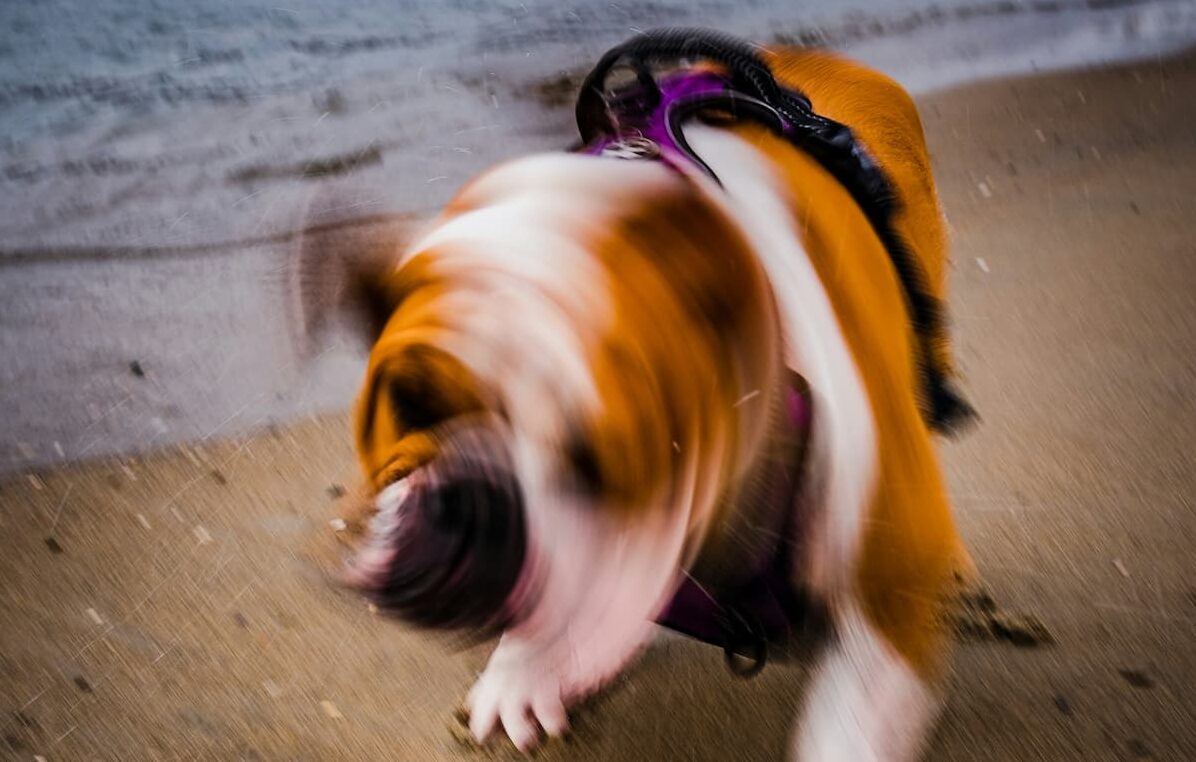Have you ever woken up to the sound of your dog vigorously shaking their head like they’re trying to create a small tornado in your bedroom?
Does it always leave you scratching your head (pun intended)?
Read on to find the fascinating reasons behind this behavior.
Understanding the Physiology behind Head Shaking
Dogs, those adorable and sometimes quirky creatures that we love so much, often engage in some interesting behaviors that can leave us scratching our heads in wonder.
One such behavior is when they shake their heads vigorously as soon as they get up.
If you’ve ever noticed your furry friend doing this, you might be curious to know why they do it.
Here are the fascinating reasons for this head shaking behavior:
1. Doggy communication and sensory satisfaction: One of the main reasons dogs shake their heads when they get up is to communicate with us and other dogs.
Dogs use body language and movements to convey various messages, and head shaking is just one example of this.
It’s their way of saying, “Hey, I’m awake and ready to play!” or “Something exciting caught my attention!”
By shaking their heads, dogs are trying to get our attention and initiate some sort of interaction.
2. Getting Rid of Excess Moisture: another reason dogs shake their heads when they get up is to remove any excess moisture or water that might have accumulated in their ears.
Dogs have an amazing ability to shake their heads vigorously from side to side, and this action helps to dislodge the liquid, preventing it from causing discomfort or potential ear infections.
So, next time you see your furry friend shaking their head after a swim or a bath, you’ll know they’re just trying to get rid of those pesky droplets.
3. Keeping the Sensory System Alert: Dogs possess an intricate sensory system, and head shaking can be a way for them to stimulate and refresh it.
Just like humans blink to keep their eyes moist and functioning optimally, dogs shake their heads to invigorate their ears, nose, and mouth.
By shaking, they create movement that encourages blood circulation and awakens nerves, enhancing their overall sensory experience.
4. Dislodging Irritating Particles: Dogs love to explore their surroundings, sometimes sticking their curious noses where they shouldn’t.
Head shaking can help dislodge any small particles or foreign objects that might have accidentally entered their ears or landed on their face while sniffing around.
It’s a natural way for dogs to clear irritants, securing a comfortable and uninterrupted sensory journey.
5. Maintaining their Balance and Coordination: Believe it or not, head shaking isn’t only about communication or ear hygiene – it also plays a role in a dog’s balance and coordination.
Dogs rely heavily on their sense of equilibrium, and shaking their heads helps them reset any inner ear imbalances that may have occurred during sleep or after a nap.
Think of it as a doggy version of stretching and getting ready for the day ahead, ensuring they can navigate their surroundings with precision and stability.
Common Causes of Head Shaking in Dogs
While head shaking may seem innocuous at first, there could be some underlying reasons for this peculiar habit:
1. Ear Infections: One of the primary reasons dogs shake their heads is due to ear infections.
These infections can be caused by bacteria, yeast, allergies, or even foreign objects lodged in their ears.
When your dog wakes up, they might experience discomfort or itchiness in their ears, leading them to shake their heads vigorously as a way to alleviate the irritation.
2. Water in Ears: Dogs often love to play in water, whether it’s swimming in a pool or splashing in puddles during their walks.
While water can be fun, it can also get trapped in their ear canals, causing discomfort.
Upon getting up, dogs might shake their heads vigorously to dislodge the water and prevent any potential complications, such as ear infections.
3. Fleas or Ticks: These pesky parasites can cause extreme discomfort for dogs.
When they infest your pet’s ears, the constant biting and irritation can make dogs shake their heads in an attempt to get rid of these unwelcome guests.
Regularly checking and treating your dog for fleas and ticks can help prevent this issue and keep your furry friend happy and itch-free.
Vital Indication and Time That You Should Be Concerned
While head-shaking may seem harmless, it’s important not to overlook potential red flags. So, when should you start to worry?
Firstly, if the head shaking becomes excessive, repetitive, or seems out of the ordinary for your dog, it’s wise to pay close attention.
Excessive scratching or pawing at the ears, unusual discharge, or a foul smell could also be signs of an underlying issue.
It’s crucial to monitor their behavior and, when in doubt, consult with your veterinarian.
They can perform a thorough examination, suggest appropriate tests, and provide the necessary treatment if needed.
How to Address Head Shaking in Dogs
If you notice your dog frequently shaking their head when they get up, it is crucial to address the root cause of this behavior to ensure their well-being.
First and foremost, make sure to inspect their ears for any visible signs of redness, discharge, or swelling.
If you suspect an ear infection or the presence of mites, it is essential to consult a veterinarian who can diagnose and prescribe the appropriate treatment.
Additionally, regular ear cleaning with gentle, vet-approved solutions can help prevent issues and provide relief.
Be sure to use a soft cloth or cotton ball, avoiding Q-tips or any sharp objects that could harm their delicate ears.
Treating any underlying allergies that may be causing itching or irritation can also help reduce head shaking in dogs.
Keeping Your Pup’s Ears Healthy and Minimizing Head Shaking
To minimize head shaking and keep your furry friend’s ears healthy, it’s important to establish a regular ear cleaning routine. Here are a few tips to get you started:
1. Use a veterinarian-approved ear cleaning solution: Look for a gentle, pH-balanced solution specifically made for dogs.
Avoid using q-tips or cotton swabs, as they can push debris further into the ear canal and potentially cause damage.
2. Gently wipe the outer ear: Moisten a clean, soft cloth or cotton ball with the cleaning solution and gently wipe the outer part of your dog’s ear, making sure to remove any visible dirt or wax.
3. Allow your pup to shake: After cleaning, give your dog some space to shake off any excess moisture.
Their natural head shaking will help to remove any remaining fluid from the ear canal.
4. Monitor your pup’s ears: Regularly check your dog’s ears for any signs of redness, swelling, odor, or discharge.
If you notice anything unusual or your dog’s head shaking becomes excessive, it’s best to consult your veterinarian for a thorough examination.
By incorporating these preventive measures into your pup’s routine, you’ll not only minimize head shaking but also promote good ear health.
Remember, prevention is key when it comes to keeping your furry companion happy and healthy!
FAQ
Q: Why exactly do dogs shake their heads?
A: Dogs, like us humans, have an inner ear that helps them maintain their balance.
When they wake up after a nap, these sensitive little canals might need a bit of a reset.
By shaking their heads vigorously, our pups are trying to realign those delicate ear parts to get back on their steady paws.
It’s kind of like hitting the refresh button!
Q: Is it always related to their balance?
A: Not necessarily!
Another reason your pooch might shake their head is to get rid of any discomfort or irritation in their ears.
Dogs are prone to ear infections, and sometimes, they might feel itching, pain, or even a tickle that prompts a swift shake.
It’s their way of saying, “Hey, something’s bugging me, and I need to fix it!”
Q: Should I be concerned if my dog shakes their head often?
A: While the occasional head shake is normal, frequent or excessive shaking could indicate an underlying issue.
If you notice your furry buddy shaking excessively, scratching their ears persistently, or tilting their head to one side, it’s time to pay a visit to the vet.
These could be signs of ear infections, mites, allergies, or even foreign objects trapped in their ears.
It’s best to get them checked out to keep those wiggly ears healthy and happy.
Q: Can I do anything to help prevent ear discomfort in my dog?
A: Absolutely!
Regular ear cleaning is essential for our canine companions.
However, it’s important to do it carefully and gently.
Consult your vet for the best ear cleaning techniques and the right products to use.
Remember, their ears are sensitive, so avoid using cotton swabs or inserting anything into the ear canal.
Prevention is key, so keeping their ears clean and dry can significantly reduce the likelihood of ear issues.
Q: Are there certain dog breeds more prone to ear problems and head shaking?
A: Yes, indeed!
Some breeds are more susceptible to ear infections and therefore, might shake their heads more often.
Dogs with floppy ears, such as Basset Hounds, Cocker Spaniels, or Labradors, have longer ear canals that can trap moisture and debris.
This creates a cozy environment for bacteria and yeast to thrive, leading to infections.
So, if you have a dog with pendulous ears, it’s crucial to pay extra attention to their ear hygiene.
Q: Can I offer any relief if my dog has itchy ears from allergies?
A: Allergies can undoubtedly make our canine companions quite uncomfortable.
If you suspect your dog’s head shaking is due to allergies, consult your vet.
They may recommend allergy tests or prescribe appropriate medication, such as antihistamines, to alleviate the itchiness.
Remember, never use human medications without veterinary guidance, as they can be harmful to our furry pals.
Q: Is there anything I should be cautious about when my dog shakes its head?
A: When a dog does its iconic head shake, it’s important to be mindful of your surroundings.
We all know how excitedly they do it, and sometimes, that can lead to a spray of drool or even ear wax flying around.
So, ensure you’re out of the line of fire or that you keep a hand nearby to wipe off any unexpected surprises!
Q: Can I give my dog any extra love or attention during their head-shaking routine?
A: Of course!
Affection and gentle reassurance are always welcomed by our furry friends.
So, why not give them a little head rub or scratch behind the ears?
It can make them feel safe and loved, and who knows, they might even shake their head a little less if they feel extra pampered!
Remember, head shaking is usually a normal and harmless behavior in dogs.
However, keep an eye out for any drastic changes or signs of discomfort.
Just like humans, our four-legged buddies sometimes need a little extra care to keep them happy and healthy!
Ultimate Closing
Next time you spot your pup giving themselves an energetic head-shake after a nap, know that it’s not just some amusing habit, but an essential part of their sensory routine.
Just like us humans stretch and yawn to shake off sleepiness, dogs have their own special way of getting their senses back in check.
So the next time you witness this amusing ritual, take a moment to appreciate the wonders of your pooch’s life.
After all, their head-shaking habits are just another endearing reminder of how wonderfully peculiar our four-legged companions truly are!













